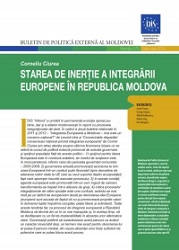Inertia of European Integration in the Republic of Moldova
Inertia of European Integration in the Republic of Moldova
Author(s): Corneliu Ciurea
Subject(s): International relations/trade, EU-Approach / EU-Accession / EU-Development
Published by: IDIS VIITORUL Institutul pentru Dezoltare şi Initiative Sociale
Summary/Abstract: IDIS „Viitorul” has consistently followed the evolution of the public and Moldovan elites’ opinion related to Moldova’s European integration processes. In two bulletins published in 2011 and 2012, “European integration of Moldova – is there still a national consensus?” by Leonid Litra and “Consequences of the disappearance of the national consensus on European integration” by Cornel Ciurea, we drew attention to some bizarre phenomena in the foreign policy promoted by the current government and the public support to these policies: 1) the support of the European idea is continuously decreasing and is paradoxically lower than during the communist governance in 2005 – 2009; 2) the current government promotes European Union association in an unfavorable context (unlike the accession of new states to the EU, which enjoyed full support of the population), which increases the risks associated to the process; 3) the European agenda is promoted under these conditions within a narrow circle of people, gradually becoming a group affair; 4) the criticism of integration processes by the opposition is confusing, focusing more on a Europeanism deficits rather than on the demolition of European idea (the Europeans are accused of failing to promote their own ideas in the fight against corruption, free market and enlargement). All these tendencies make the European integration of the Republic of Moldova increasingly unpopular. At the same time they take place with a grimness and absence of clear alternatives. Public officials prefer to characterize this process as having an irreversible character, but a more accurate term would be an inertial course / coasting, due to the lack of sufficiently strong forces that could obstruct this process.
Series: Moldova’s Foreign Policy Statewatch
- Page Count: 3
- Publication Year: 2014
- Language: English
- Content File-PDF

